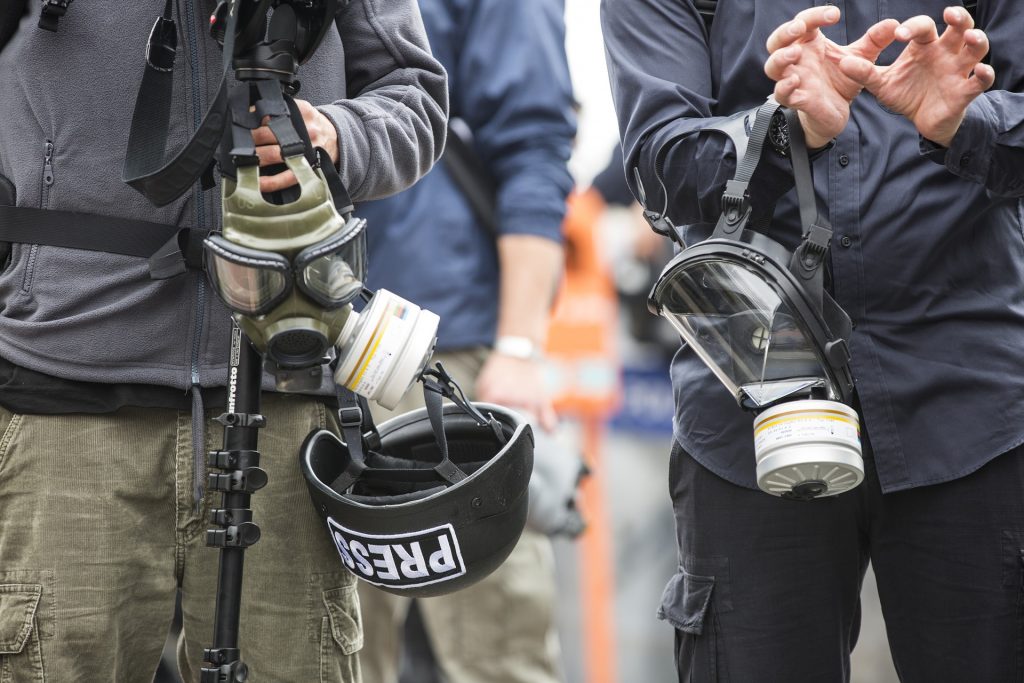Daily news is an important source of information for many degree subjects. Find out how you can access news stories online and use them in your assignments.
Newspapers live only in the present tense and, as a consequence, give the time traveller an unparalleled sense of what the world was like – the prejudices, the habits, manners and preoccupations seen through a fixed prism. —Richard Eyre, Saturday Guardian, March 11, 2007
When we have news alerts popping up on our phone screens, or follow news feeds on social media, newspapers can seem a thing of the past; a folded bundle of news and advertisements we might find at a railway station and flick through when our phone battery dies. However, newspapers, although only one form of news media, still have an important role to play in recording events as they happen, and cross-searching aggregated news stories across a database can help you identify impact and trends which will inform your arguments. Whether this will continue to be the case, as media streams mutiply, is of course debatable, but for now they are the most organised form of news.
Why would I use a news story?
There are many reasons why you might wish to use news stories. A politics students might wish to know how Brexit is reported in the regional press such as the Aberdeen Evening News or the South Wales Echo or look for political slant or affiliations in editorials and reportage in the national broadsheet and tabloid newspapers. A public health student might want to see how Covid-19 is reported and how this impacts on public behaviour.
Modern historians may wish to trace reportage on an event such as the Falklands War or the Good Friday Agreement and journalism, media or language students might look at reporting style or language used in newspapers. Performing arts students might wish to trace a review of a production or look at the reception and popularity of theatrical productions over time, a business student may wish to see how companies perform. The possibilities are endless.

What is available?
The University Library subscribes to a range of news sources. The following are sources of twenty-first century news and if you would like to find out more about our historic news sources, it is recommended that you read the history subject guide.
Lexis®Library Newspapers UK: a forty year archive of full text news articles. It is updated daily with news items from a range of UK national and regional newspapers. You can search all the newspapers simultaneously or by type e.g. broadsheet (e.g. The Times, The Guardian); tabloids (e.g. The Sun or The Daily Express); or regional newspapers (e.g. The Birmingham Post)
Times Digital Archive: although providing access to only one newspaper title the Times Digital Archive provices full-text coverage from 1785-2014, but sadly not up to the present day. Originally established with the intention “to record the principal occurrences of the times” for the service of the public, The Times aims to provide ‘fair argument’ but admits to taking a stance on some political issues, such as supporting Remain in the 2016 EU referendum.
Financial Times – A British newspaper with a special emphasis on UK and international business, finance, economic and political news, comment and analysis. From 2000 until the present.
How can I use news in my assignments?
It is always best to check whether you can use news reports in your assignments. For some subjects it wouldn’t be appropriate to include an opinion piece written by a journalist, who is not an expert in the given field. For example, health professionals need evidence-based research, not conjecture or stories designed to be emotive.
To find out why news can sometimes present a distorted view of the world, read Amol Rajan’s blog about Fake News. And consider the quotation below, is this fake news or fact? Lies, damned lies or statistics? or a deliberate juxtoposition of evidence to lead you to a pre-determined conclusion?
“Did you know that thongs are four times more likely to be mentioned in the Daily Star than the Guardian, but boxer shorts are six times more likely to be mentioned in the Guardian than the Daily Star?”
Why not try looking at Lexis®Library Newspapers UK and draw your own conclusions. What do you think the author is trying to infer? And is that good research?
It is also sensible to use a good fact checker e.g. Channel 4’s Fact Check @FactCheck.

Where can I find the online newspapers?
Go to LibrarySearch or access the library via Assets in your Blackboard. Then log in using your CCCU username@canterbury.ac.uk and your password.
Select Find Databases A-Z, click on F, L or T then click on the link to the newspaper database to open it in a new tab.
How do I search them?
Lexis Library
You have the option to “Search all UK News” or to Browse Sources and choose a newspaper title e.g. The Guardian. You can then search within this newspaper. Use speech marks if you wish to search for a phrase e.g. “Dow Jones” or “The Church of England”. When you have your results you can refine your search by limiting by date of publication. You can also add additional words and phrases. You can search for business news by using the Industry option in the left-hand menu. e.g. “Pizza Express” limited by “Food and Beverage” (Note, you may wish to use the More Search options and use the drop down menu AND NOT if you wish to eliminate a story about a certain member of the royal family’s visit to Pizza Express at Woking.)
Example Searches:
If you were interested in The Church of England during Rowan Williams’ archepiscopy you could search for “The Church of England” “Rowan Williams” and limit by date from 1/12/2002 to 1/12/2012.
If you wanted to find out whether Canterbury had been mentioned in the newspapers over the past 7 days, you could do an Advanced Search and look for the words “Canterbury” and limit by date, but if you wanted news specifically about the city, you might want to add in a limit by adding an additional drop down box “AND NOT Archbishop” or “AND NOT New Zealand”
Fore more detailed information, read the Lexis guide.
Financial Times
The Financial Times online is not a searchable database in the same way as Lexis which aggregates news from several newspapers. It is an online edition of a daily newspaper. You can still search it, but your results are less easy to manage and analyse. You can read our printable guide to The Financial Times to find out more.

Times Digital Archive
The Times has some sophisticated features such as Topic Finder and Term Frequency. You can view search results over time by entering a word or phrase and compare multiple terms. You can search for frequency (number of documents by year) or popularity (percentage of documents by year)
Frequency Search :
The appropriacy of using the word ‘ladies’ has been much debated, leading to its rise and fall in news reports. Using a frequency search, we can see that from its peak in 1937, ‘ladies’ slumped to an all-time low in 1979 (ironically a year before Margaret Thatcher’s speech to the Conservative Party Conference on 10 October 1980 in which she announced “the lady’s not for turning’), but has now returned to the level of usage experienced before the reign of Queen Victoria.
Popularity Search:
If we do a popularity search for ‘ladies’, it is a different story, showing a steady decline from 1937 plateauing in the early 1990s. This is because the number of documents is not always the same at any one given time. It would be tempting to point to the massive drop in usage from 1937-1945 (in a frequency search) and attribute this to a growing respect for women, however this does not take into account the drop in the number of articles written. Newspapers were smaller during the Second World War due to the rationing of paper. By doing a popularity search we can see that ‘ladies’ was mentioned in 4% of documents in 1937 compared to 1.4% in 1945, but given the political events of the day, and the dominance of war coverage, it would be important to balance this with a search for the use of the word ‘women’ over the same period. Therefore it is important to analyse the data thoroughly before making sweeping statements and to apply a level of criticality about all results.
For more detailed tips, read the Times Digital Archive guide.
Will I get the full newspaper online?
Although Lexis is described as a ‘forty year archive’, this doesn’t mean that coverage for all newspapers is forty years.
Example:
I would like to know how the sinking of the Argentinian warship the Belgrano was reported in May 1982 just after it happened. I particularly want to see the infamous Sun headline ‘Gotcha’ in context and to find out how other newspapers reported it. However, by browsing the list of newspapers I discover that the coverage for The Sun is from January 1, 1996 through to current (only a 24 year coverage). In fact the only available information on the event comes from the BBC Monitoring: International Reports which provide news and information based on round-the-clock monitoring of radio, TV, press, internet and news agency sources around the world.
In addition, you don’t get the full newspaper experience. The Sun states that access to certain freelance articles and other features within this publication (i.e. photographs, classifieds, etc…) may not be available. So, before you waste valuable research time using online newspapers, be sure to check out what exactly you can find.

Images
Photographs are not included in all the databases, so if you are interested in how press photography can influence audience emotion bear this in mind. Lexis provides a plain text version of the news articles, The Times Digital Archive provides black and white images and the Financial Times provides colour ones.
Finding out more
If you would like to know more about how news databases are used in research, you can read the following articles on LibrarySearch:
Krennmayr, T. (2015) ‘What corpus linguistics can tell us about metaphor use in newspaper texts’, Journalism Studies, 16(4), pp. 530-546.
Tumbe, C. (2019) ‘Corpus linguistics, newspaper archives and historical research methods’, Journal of Management History 25(4), pp. 533-549.
You can also read JSTOR’s ten lessons on media literacy and fake news to help you think critically about media.
Can I use them off campus?
If you are away from campus, or connecting with your own device over Wi-Fi, you will need to include @canterbury.ac.uk after your CCCU username
[username@canterbury.ac.uk] as well as your normal CCCU password.
Do they have any special accessibility features?
Accesibility information is available in the printable guides. Instructions for JAWS screen reader users are available on request from Lexis.
How do I cite news sources?
When citing from online newspapers, it is important to acknowledge your source. Cite them Right includes important detail about citing electronic or print articles, regional newspapers, online newspapers, letters, sections and editorials, and online-only articles.
Example electronic or print article (Harvard Style):
In-text citation
Climbers owe their lives to Marsbars (Passmore, 1993).
Reference List
Passmore, J. (1993) ‘The magical survival power of a Marsbar’, Evening Standard 16 April, p. 5.
Example of a newspaper article found online and with no page numbers (Harvard Style):
In-text citation
According to a YouGov poll, 61% of people support a wealth tax (Hughes, 2020).
Reference List
Hughes, L. (2020) ‘Labour increases pressure for a UK wealth tax’, The Financial Times 3 July. Available at: https://www.ft.com/content/7c7a1013-c8b3-41f0-85a4-1a7594b48b68 (Accessed: 4 July 2020).
Where can I get further help?
Your Learning and Research Librarian will be able to help you make the best use of online resources.
You can book an appointment with them online via the Learning Skills Hub or email learner@canterbury.ac.uk to arrange a convenient time to meet.
 Library
Library Michelle Crowther
Michelle Crowther 3119
3119


